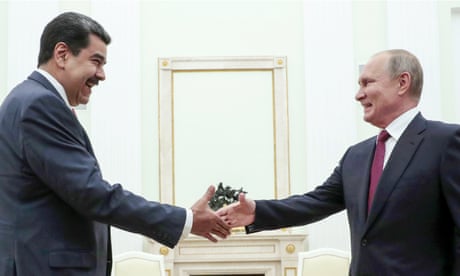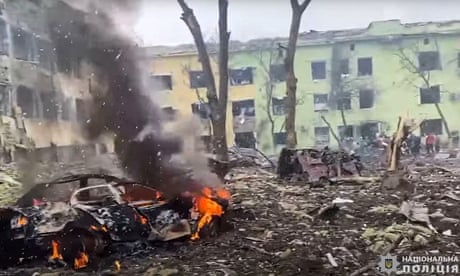Ukraine president accuses Moscow of deliberate attack on humanitarian corridor in Mariupol as Russian forces fan out around capital and Biden prepares further trade restrictions
Ukraine’s president, Volodymyr Zelenskiy, has accused Russia of being a “terrorist state”, saying it prevented a delivery of food, water and medicine to the besieged city of Mariupol by attacking a humanitarian corridor with tank fire.
As Russian forces appeared to be regrouping in order to encircle Kyiv and the US planned to ratchet up the economic pressure on Vladimir Putin, Zelenskiy tried to rally Ukrainians with another video address late on Thursday condemning Moscow’s relentless assault on cities.

‘A necessary war’: reporting on the Ukraine ‘disagreement’ outside the west
“This is outright terror ... from experienced terrorists,” he said of the alleged attack on the aid convoy. “The world needs to know this. I have to admit it – we are all dealing with a terrorist state.
“They did it deliberately, they knew what they were blowing up, they have an order to keep the city a hostage, abuse it and bomb it constantly, and shell it.”
More than 400,000 people remain trapped in Mariupol, which is surrounded by Russian forces, and basic supplies are running out. Some 200,000 are believed to want to leave amid a relentless Russian artillery onslaught but have not been able to do so despite the daily declaration of humanitarian corridors.
Mariupol’s mayor, Vadym Boichenko, said Russia was targeting residential areas “every 30 minutes”. At least 1,207 people have died although the real figure is believed to be much higher because residents cannot leave their homes to retrieve dead bodies from the streets.
Zelenskiy said no one had been able to escape the city on Thursday, although 100,000 had managed to leave other under-fire cities such as Irpin near Kyiv, Sumy and Hostomel in the past two days.
In a potentially significant military development, satellite images released by the US company Maxar Technologies on Thursday appeared to show that the large Russian military convoy last seen north-west of Kyiv had largely dispersed and redeployed. Maxar said its pictures showed that armoured units had fanned out through towns and forests in the area, with artillery pieces moved into potential firing positions.

No longer scared – just tired: Mariupol residents focus solely on survival
A US defence official cited by CNN said that Russian forces had moved 5km (about 3 miles) closer to Kyiv, despite Ukrainians fighting back “very, very well” around the capital city.
The Ukrainian military said in its daily operational report on Friday morning that Russian troops had dispersed to regroup and replenish supplies.
In Lviv, Ukraine’s westernmost large city, air sirens were heard in the early hours of Friday. Explosions were also reported in Lutsk in north-western Ukraine, near the Polish border, as well as in Dnipro, a major stronghold in central-eastern Ukraine. Three air strikes in Dnipro killed at least one person, state emergency services said, adding that the strikes were close to a kindergarten and an apartment building.
The strike in Lutsk targeted an airfield according to city’s mayor, Igor Polishchuk, who urged his citizens to take cover in a Facebook post early on Friday.
US president Joe Biden will announce another ratcheting up of the economic pressure on Friday when he calls for the end of normal trade relations with Russia. This measure, which is likely to be rubber-stamped and passed into law by Congress, will make Russia a pariah in the world economy in the same category as Cuba and North Korea. It could lead to increased tariffs on Russian goods and will remove what in international trade is termed “most favoured nation status” .
It follows the decision by Biden and British prime minister Boris Johnson this week to ban oil imports from Russia into their countries as they attempt to increase already crippling pressure on Russia brought on by its exclusion from global financial markets.
The price of oil slipped back again on Friday and is set to record its biggest weekly drops since November after see-sawing on fears that more countries would ban Russian imports, balanced by the growing prospect that other big producers could bring on more supply.
Brent crude, the international benchmark, fell 0.67% to $108.60 at 2am GMT after dropping 1.6% in the previous session. US West Texas intermediate crude fell 0.13% to $105.88 a barrel, following a 2.5% decline on Thursday.
Outlawing all US trade with Russia would deepen the already serious economic problems facing Putin’s regime.
Earlier on Thursday, the head of the International Monetary Fund, Kristalina Georgieva, said Russia was “moving into a deep recession”, with massive depreciation of the rouble and sinking purchasing power for its citizens. A debt default was no longer “an improbable event”, she said.
A stream of leading international companies such as Apple, Shell, Ikea and McDonald’s have pulled out of Russia, but the Kremlin is threatening to retaliate by seizing corporate assets.
European Union leaders meeting at Versailles to discuss the Ukraine crisis said in a statement on Thursday night that Russia was “inflicting unspeakable suffering on the Ukrainian population” and called for an immediate and unconditional withdrawal of forces.
They “acknowledged the European aspirations” of Ukraine and agreed to support Ukraine in “pursuing its European path”. They also praised Ukraine’s courageous resistance and promised “we will not leave them alone”.
Many east European member countries such as Estonia and Lithuania have called for Ukraine to be fast-tracked into the 27-member club. But the careful language of the statement stopped a long way short of any hard commitments and reflected unease in western countries such as France, Spain and the Netherlands about any rapid admission.
“What’s important is that Ukraine has asked to be member of the EU,” said Dutch prime minister Mark Rutte. “There is no fast-track procedure to become a member of the EU.”
Zelenskiy attempted to keep the pressure up on the EU, however, saying in his address that he believed the Ukrainian people “have done everything to be welcomed” into the European club.
“This is the final exam for Europe,” he said, adding that ordinary people in Europe had shown their support for Ukraine by protesting in the streets, and that “they would definitely choose Ukraine”.
Russian forces edge closer to Kyiv as city becomes ’fortress’
KYIV

Russian troops edged closer to Kyiv on March 11, as officials said the Ukrainian capital was being transformed into a "fortress" and President Volodymyr Zelensky accused Moscow of again targeting humanitarian corridors.
Hundreds of thousands of civilians remain holed up in Ukrainian cities, including besieged Mariupol, under a Russian bombing campaign after the first talks between Moscow and Kyiv’s top diplomats ended without any progress.
The Ukrainian military in a statement warned "the enemy is trying to eliminate the defences of the Ukrainian forces around" regions to the west and northwest of the capital "to block Kyiv."
"We can’t rule out a movement of the enemy to the east towards Brovary," the statement added.
In the capital, mayor Vitali Klitschko said half the population had fled, adding that the city "has been transformed into a fortress".
"Every street, every building, every checkpoint has been fortified."
Russian forces are currently encircling at least four major Ukrainian cities and armoured vehicles have rolled up to Kyiv’s northeastern edge, where suburbs including Irpin and Bucha have endured days of heavy bombardment.
Ukrainian soldiers there described fierce fighting for control of the main highway leading into the capital, and AFP reporters saw missile strikes in Velyka Dymerka just outside Kyiv’s city limits.
"It’s frightening, but what can you do?" said Vasyl Popov, a 38-year-old advertising salesman. "There is nowhere to really run or hide. We live here."
Britain’s defence ministry said in an intelligence update that "Russian forces are committing an increased number of their deployed forces to encircle key cities."
"This will reduce the number of forces available to continue their advance and will further slow Russian progress," a statement tweeted by the ministry said.
But there has been no let-up in the onslaught on several major cities, with the besieged southern port city of Mariupol suffering relentless bombardment, including on attempted aid deliveries, according to Zelensky.
He said Moscow had launched a "tank attack" targeting a humanitarian corridor where he had dispatched a convoy to try to get food, water and medicine into the city.
The attack, which Zelensky described in a video statement as "outright terror", came a day after the bombing of a children’s hospital there that local officials said killed three people, including a young girl.
Zelensky branded that attack a Russian "war crime", a position backed by top Western officials, while Russia’s army claimed the bombing was a "staged provocation" by Ukraine.
In a video, Mariupol mayor Vadym Boichenko said Russian warplanes had targeted residential areas in the city "every 30 minutes" on Thursday, "killing civilians, the elderly, women and children."
The situation in city has been described as "apocalyptic", with more than 1,200 civilians killed in 10 days of constant attacks, according to the mayor.
The International Committee of the Red Cross said some residents had started fighting for food, and many had run out of drinking water.
"Some people still have food but I’m not sure for how long it will last. Many people report having no food for children," said Mariupol-based ICRC representative Sasha Volkov in an audio recording.
Some humanitarian corridors out of cities under attack have held.
Around 100,000 people have been able to leave the northeastern city of Sumy, the eastern city of Izyum, and areas northwest of Kyiv in the last two days, Ukrainian officials said.
Moscow said it would also open daily humanitarian corridors to evacuate civilians to Russian territory, but Kyiv has rejected routes leading to Russia.
The UN’s refugee agency estimates more than 2.3 million refugees have left Ukraine since Russia shocked the world by invading its neighbour on February 24, and some 1.9 million Ukrainians have been internally displaced.
Overall, at least 71 children have been killed and more than 100 wounded in Ukraine since the war began, said Lyudmyla Denisova, the Ukraine parliament’s point person on human rights.
And the UN says two other Ukrainian maternity hospitals have been attacked and destroyed, including one in Zhytomyr, west of Kyiv, in addition to the Mariupol attack.
In Turkey, Ukraine’s Foreign Minister Dmytro Kuleba said his talks with his Russian counterpart Sergei Lavrov ended with "no progress," even on a 24-hour ceasefire.
Lavrov said the two sides would keep talking, but also insisted Russia’s invasion was purely defensive.
Asked by a reporter if Moscow was planning to attack other nations, he insisted "we don’t plan to attack other countries" and Russia "did not attack Ukraine".
He said Russian President Vladimir Putin launched the operation as the situation in Ukraine "posed a direct threat to the Russian Federation".
No comments:
Post a Comment